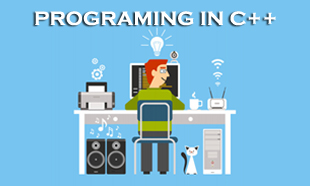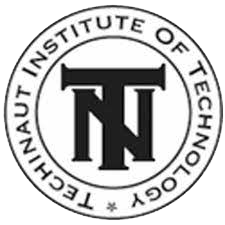0
Programming Course in C++ at Shri Sai Computer Coaching Institute is designed for individuals who want to learn C++ programming from scratch or enhance their existing skills.
SHRI SAI COMPUTER COACHING INSTITUTE, located in Yenbodi, Amdi, Chandrapura, Maharashtra, offers a six-month Programming Course in C++. As a franchisee of Techinaut Institute of Technology, the institute provides a comprehensive curriculum that covers the fundamentals of C++ programming, object-oriented programming concepts, and advanced topics such as templates and exception handling. This course will equip students with the knowledge and skills to develop robust and efficient C++ programs.
INTRODUCTION OF THE COURSE:
The Programming Course in C++ at SHRI SAI COMPUTER COACHING INSTITUTE is designed for individuals who want to learn C++ programming from scratch or enhance their existing skills. Whether you are a student looking to enter the field of software development or a professional seeking to upgrade your programming skills, this course offers a comprehensive curriculum that covers all aspects of C++ programming.
THE OBJECTIVE OF THE COURSE:
The Programming Course in C++ aims to provide students with a solid foundation in C++ programming and object-oriented programming concepts. The course aims to equip students with the knowledge and skills to develop efficient and maintainable C++ programs. By the end of the course, students will be able to design, develop, and debug C++ programs, making them valuable assets in the software development industry.
COURSE CURRICULUM:
1. Introduction to C++:
The course begins with an introduction to C++, including its history, features, and applications. Students learn about the basic syntax of C++ programming, including data types, variables, and operators. They also gain practical experience writing simple C++ programs, laying the foundation for more complex programming concepts.
2. Object-Oriented Programming Concepts:Object-oriented programming (OOP) is a programming paradigm that uses objects and classes to represent data and behavior. In this module, students learn about the principles of OOP, including encapsulation, inheritance, and polymorphism. They also learn how to design and implement classes and objects in C++, gaining a deeper understanding of the OOP concepts.
3. The Basics of C++:This module covers the basic concepts of C++ programming, including input and output operations, decision-making statements, and looping constructs. Students learn how to use the basic features of C++ to write simple programs that solve real-world problems.
4. Working with Operators and Expressions:Operators are symbols that perform operations on operands. In this module, students learn about the different types of operators in C++, including arithmetic, relational, logical, and bitwise. They also learn how to use expressions to perform calculations and manipulate data, gaining practical experience using operators and expressions in C++ programming.
5. Controlling the Program Flow:Program flow control is essential for controlling the execution of a program. In this module, students learn about decision-making statements such as if-else and switch-case and looping constructs such as for, while, and do-while. They also learn how to use these statements to control the flow of a program, gaining practical experience in writing structured and efficient C++ programs.
6. Using Functions/Procedures:Functions are blocks of code that perform a specific task. In this module, students learn how to define and use functions in C++. They learn about function prototypes, parameters, return types, and recursion, gaining practical experience writing modular and reusable code.
7. Pointers and Arrays:Pointers are variables that store memory addresses. In this module, students learn about pointers and how to use them in C++ programming. They also learn about arrays, which are collections of elements of the same data type, gaining practical experience using pointers and arrays to manipulate data efficiently.
8. Binding Data and Functions:Binding is associating data with functions. In this module, students learn about the different types of binding in C++, including static binding and dynamic binding. They also learn to use binding to create classes and objects, gaining practical experience implementing data and function binding in C++.
9. Function and Operator Overloading:Function overloading defines multiple functions with the same name but different parameters. In this module, students learn how to overload functions and operators in C++, gaining a deeper understanding of polymorphism and code reusability.
10. Reusing Classes:Class reuse is using existing classes to create new classes. In this module, students learn about class reuse in C++, including inheritance and composition. They also learn how to create and use base and derived classes, gaining practical experience reusing classes to create complex programs.
11. Virtual Functions and Polymorphism:Virtual functions can be overridden in derived classes. In this module, students learn about virtual functions and how to use them to achieve polymorphism in C++. They also learn about pure virtual functions and abstract classes, gaining practical experience in implementing polymorphism in C++.
12. Templates:Templates are a powerful feature of C++ that allows for generic programming. In this module, students learn about templates and how to create generic classes and functions. They also learn about the different types of templates, including function and class templates, gaining practical experience using templates to write flexible and reusable code.
13. Exception Handling:Exception handling errors and exceptional conditions in a program. In this module, students learn about exception handling in C++, including try, catch, and throw statements. They also learn to handle exceptions to write robust and reliable C++ programs.
CONCLUSION:
The Programming Course in C++ at Shri Sai Computer Coaching Institute offers a comprehensive curriculum that covers all aspects of C++ programming, from basic syntax to advanced topics such as templates and exception handling. Whether you are a beginner looking to learn C++ programming or an experienced programmer looking to enhance your skills, this course provides the knowledge and practical experience necessary to succeed in software development. Enroll today and take the first step towards mastering the art of C++ programming.
Lectures = 130 HRS
Practical/Tutorials = 130 HRS
Total = 260 HRS


